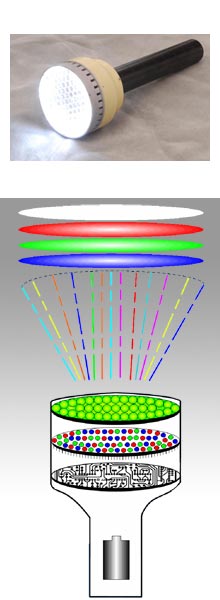Aug 7 2007
The MIT Technology Review is reporting on a new LED flashlight that can disable people by either temporarily blinding them or by nausiating them to the point of physical illness.
 The LED contains layers of electronic control circuitry, multicolored LEDs, special cicuitry and optics that produce disorienting and nausea-inducing patterns of ultrabright flashing colors. Image courtesy of Department of Homeland Security
The LED contains layers of electronic control circuitry, multicolored LEDs, special cicuitry and optics that produce disorienting and nausea-inducing patterns of ultrabright flashing colors. Image courtesy of Department of Homeland Security
The flashlight, which is being developed as a nonlethal weapon for the Department of Homeland Security (DHS), uses a range finder to measure the distance to the target's eyes so that it can adjust the energy of the light to a level that won't cause permanent damage. Then it rapidly shoots out pulses of light from an array of ultrabright light emitting diodes (LEDs).
The flashes incapacitate a person in two different ways, says Robert Lieberman, CEO of Intelligent Optical Systems, based in Torrance, CA, which is making the device. The flashes temporarily blind a person, as any bright light would, and the light pulses, which quickly change both in color and duration, also cause what Lieberman calls psychophysical effects. These effects, whose effectiveness depends on the person, range from disorientation to vertigo to nausea, and they wear off in a few minutes.
The Department of Homeland Security intend arming police, border-security agents and the National Guard with the new flashlight by 2010.